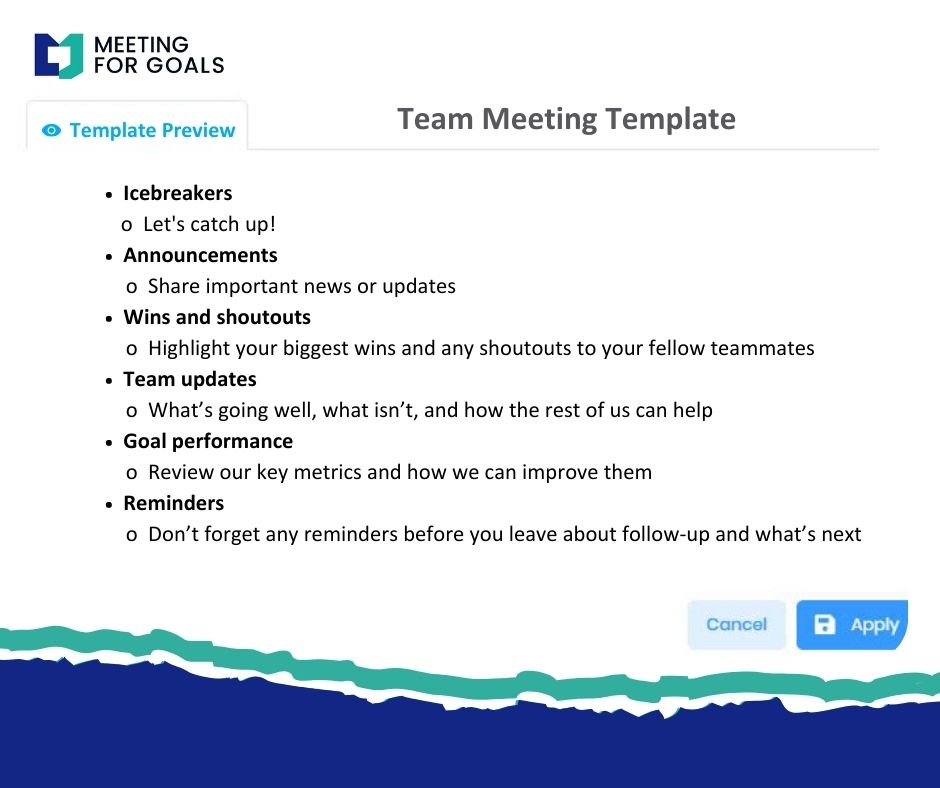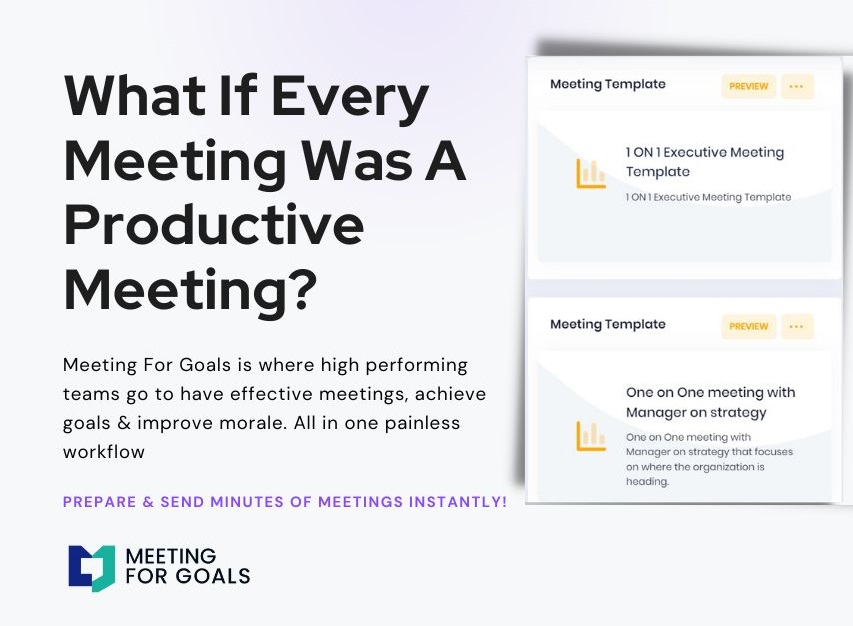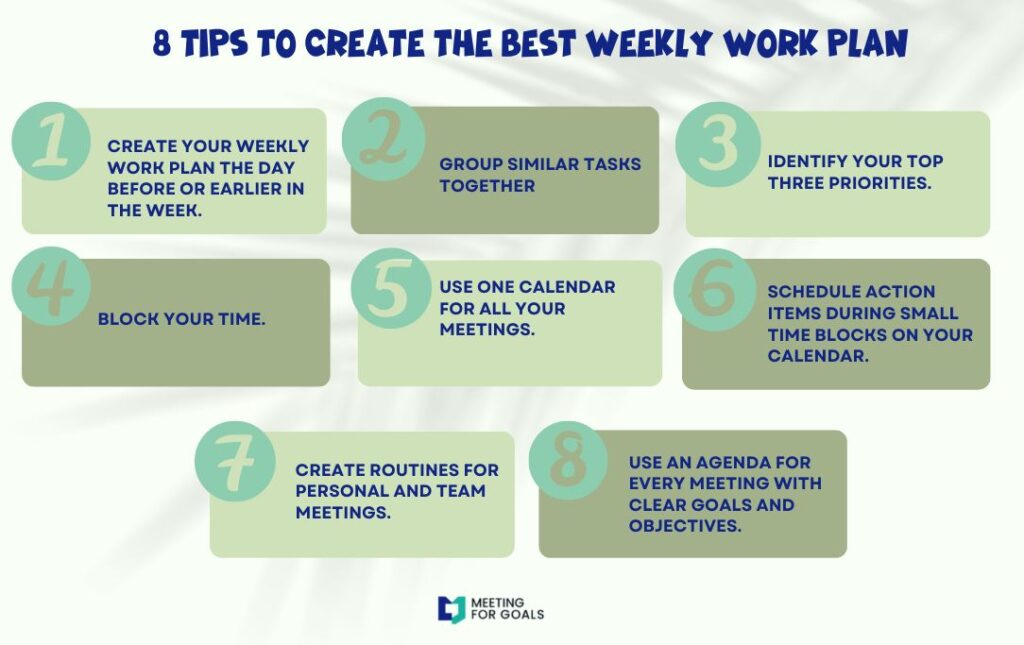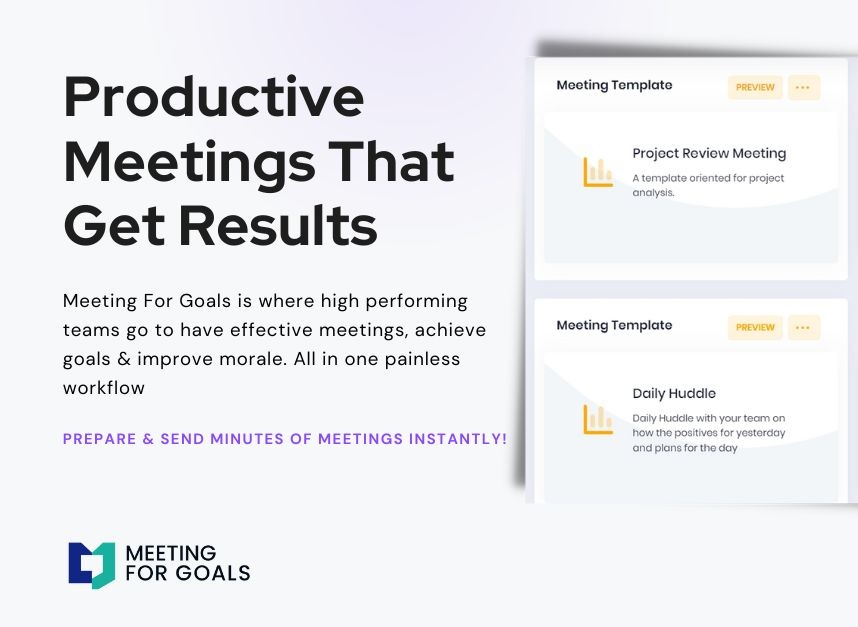Team Meeting Ideas for High-Performing Teams
In today’s fast-paced business world, unproductive meetings aren’t just frustrating—they’re costly. For directors, VPs, and C-suite executives managing teams of 40 to 70 people, every minute matters. Inefficient meetings can drain time, morale, and performance. That’s where Meeting For Goals steps in.
This dynamic meeting management software helps high-performing teams streamline their meetings, align discussions with business goals, and get more done in less time. In this article, we’ll walk you through practical, powerful team meeting ideas that boost productivity and collaboration—and show you how Meeting For Goals can transform your meeting culture.
👉 Ready to upgrade your meetings? Sign up now at https://app.meetingforgoals.com/TenantRegistration/Register.
Team Meeting Ideas for High-Performing Teams
I. Introduction
Meetings are where ideas come to life, decisions are made, and teams align. But without structure, they can quickly become a time sink. For mid-sized teams, especially in fast-moving industries, ineffective meetings can lead to confusion, missed opportunities, and burnout.
Meeting For Goals is designed to solve this. It’s more than just a calendar tool—it’s a full-featured meeting management platform that helps teams run shorter, more focused, and goal-driven meetings.
In this article, we’ll share innovative meeting ideas that help reduce fatigue, increase engagement, and ensure every meeting drives results. Whether you’re leading a marketing team, engineering department, or executive board, these strategies will help you run meetings that matter.
2 Minute Video
Watch a 2 minute demo of our meeting management software in action
II. Understanding the Challenges of Team Meetings
Before we dive into solutions, let’s take a look at what typically goes wrong in team meetings.
Common Pitfalls in Team Meetings
- Meetings run too long and lack direction.
- No clear agenda or defined purpose.
- A few people dominate the conversation.
- No follow-through after the meeting.
These issues are common—and costly. According to a study by Harvard Business Review, 71% of senior managers say meetings are unproductive and inefficient.
Impact on Morale and Productivity
When meetings feel like a waste of time, employees disengage. They stop contributing. They multitask. Eventually, they burn out or leave. For high-performing teams, where every member plays a key role, this is a serious risk.
Poor meetings also create a ripple effect. If decisions aren’t made or communicated clearly, projects stall. Misalignment grows. Accountability drops.
Aligning Meetings with Specific Goals
The solution? Make every meeting goal-driven. When meetings are tied to business objectives, they become strategic tools—not just obligations.
Meeting For Goals helps you define clear objectives, assign responsibilities, and track progress—all in one place. This ensures that every meeting moves your team forward.
Adding an Agenda
How to add an agenda instantly on Meeting For Goals
III. Innovative Team Meeting Ideas
Let’s explore four powerful strategies that can revolutionize your meetings.
A. Structured Agendas
An agenda is your meeting’s game plan. Without one, discussions drift, time is wasted, and nothing gets done.
Why It Matters
Agendas set expectations. They help participants come prepared and stay focused.
How to Implement
Use Meeting For Goals to create and share agendas ahead of time. You can assign time blocks to each item, ensuring balanced discussions and efficient use of time.
Bonus tip: Ask team members to add agenda items in advance. This boosts engagement and ensures the meeting addresses real concerns.
B. Time-Boxing Discussions
Time-boxing means assigning a specific amount of time to each agenda item. It’s a simple way to keep meetings on track.
Why It Matters
Without time limits, discussions can drag. Time-boxing keeps things moving and forces clarity.
How to Implement
Meeting For Goals lets you set time limits for each topic. You’ll get real-time alerts when it’s time to move on, helping you stay on schedule and respect everyone’s time.
C. Rotating Roles
Assigning rotating roles like facilitator, note-taker, and timekeeper helps distribute responsibility and encourage participation.
Why It Matters
When the same person runs every meeting, others may tune out. Rotating roles keeps everyone engaged and builds leadership skills.
How to Implement
Meeting For Goals makes it easy to assign and rotate roles. The platform tracks who’s doing what and ensures accountability.
Pro tip: Encourage feedback after each meeting. Ask what went well and what could improve. This helps team members grow in their roles.
D. Action-Oriented Wrap-Ups
Every meeting should end with a clear summary of next steps—who’s doing what, and by when.
Why It Matters
Without clear action items, meetings lose their impact. People leave unsure of what to do next.
How to Implement
Meeting For Goals automatically captures action items and assigns them to the right people. You’ll also get reminders, so nothing slips through the cracks.
This practice reinforces accountability and ensures your meetings lead to real progress.
IV. Engaging and Interactive Meeting Formats
Structure is important—but so is energy. These interactive formats can help keep your team engaged and collaborative.
A. Brainstorming Sessions
Brainstorming is a great way to generate ideas. But without structure, it can get chaotic.
How to Do It Right
Use Meeting For Goals’ brainstorming tools to capture ideas in real time. You can categorize and prioritize them, and even allow anonymous submissions to encourage honest input.
Benefits
- Encourages creativity
- Builds team cohesion
- Leads to more innovative solutions
According to McKinsey, companies that encourage collaborative innovation are twice as likely to outperform their peers.
B. Round Robin Sharing
In this format, each team member gets a turn to speak—whether to share updates, raise concerns, or offer feedback.
Why It Matters
Round robin sharing ensures everyone’s voice is heard, especially quieter team members who might otherwise stay silent.
How to Implement
Meeting For Goals can prompt each participant in turn and record their input. This helps build a culture of inclusion and psychological safety.
C. Visual Collaboration Tools
Visuals make complex information easier to understand. They also make meetings more engaging.
How to Implement
Meeting For Goals integrates digital whiteboards, flowcharts, and other visual tools. Whether you’re mapping out a project or reviewing KPIs, visuals help your team stay aligned.
Bonus tip: Use visuals during wrap-ups to reinforce key takeaways and next steps.
V. Following Up and Measuring Meeting Outcomes
A meeting isn’t successful unless it leads to action. That’s why follow-up and tracking are essential.
A. The Importance of Follow-Ups
After the meeting, send a summary that outlines key decisions, assigned tasks, and deadlines.
Best Practices
- Keep it short and focused
- Highlight who is responsible for what
- Include due dates
How Meeting For Goals Helps
The platform automates follow-up emails and notifications. You’ll never miss a detail—and neither will your team.
B. Tracking Outcomes and Accountability
Accountability is critical. Without it, tasks get delayed or forgotten.
Features That Help
- Task dashboards
- Automated reminders
- Progress tracking
Meeting For Goals gives you a clear view of what’s been done—and what’s still pending.
C. Measuring Meeting Effectiveness
To improve your meetings, you need data. Meeting For Goals offers built-in analytics that help you evaluate performance.
Metrics to Track
- Meeting duration
- Participation rates
- Completion of action items
- Goal alignment
These insights help you refine your meeting practices over time.
Want to see how it works? Check out Meeting For Goals and sign up today: https://app.meetingforgoals.com/TenantRegistration/Register.
VI. Additional Tips for High-Impact Meetings
Here are a few more tips to take your meetings to the next level.
1. Set Ground Rules
Establish norms like “no interrupting,” “stay on topic,” or “phones off unless necessary.” This helps maintain focus and respect.
2. Use a Consistent Format
Consistency makes it easier for team members to prepare and participate. Use templates within Meeting For Goals to standardize your meetings.
3. Shorten Your Meetings
Not every meeting needs to be an hour. Try 15- or 30-minute stand-ups for quick updates and check-ins.
4. Schedule “No Meeting” Days
Give your team time to focus. Designate one or two days per week as meeting-free to boost deep work and productivity.
5. Solicit Feedback
Ask your team how meetings can improve. Use quick surveys or anonymous polls to gather input.
VII. External Resources to Explore
For additional insights, check out these expert resources:
-
Harvard Business Review: “Why Your Meetings Stink—and What to Do About It” – A deep dive into common meeting problems and how to fix them. Read it here
-
Atlassian’s Guide to Team Meetings – Offers templates, formats, and best practices for productive meetings. Explore the guide
These resources complement the strategies shared here and offer even more ways to improve your meeting culture.
VIII. Conclusion
In today’s competitive landscape, high-performing teams can’t afford to waste time in ineffective meetings. If you’re a director, VP, or executive managing a team of 40–70 people, optimizing your meetings isn’t optional—it’s essential.
By using strategies like structured agendas, time-boxing, rotating roles, and action-focused wrap-ups, you can elevate your meetings from routine check-ins to strategic powerhouses. Add interactive formats like brainstorming, round robin sharing, and visual tools, and you’ll keep your team energized and aligned.
Best of all, Meeting For Goals makes it easy to implement these practices. From planning and execution to follow-up and analytics, everything is streamlined in one intuitive platform.
👉 Ready to run better meetings? Sign up now at https://app.meetingforgoals.com/TenantRegistration/Register and take your team’s productivity to the next level.
SEO Keywords: team meeting ideas, effective meetings, meeting productivity, high-performing teams, meeting software, meeting management, team collaboration, Meeting For Goals, productive meetings, executive meeting strategies.




